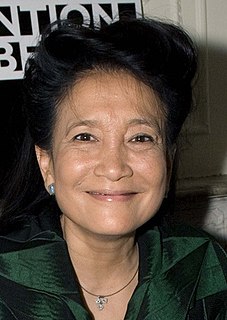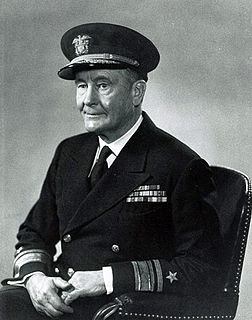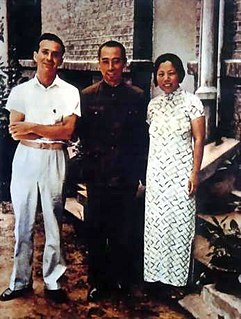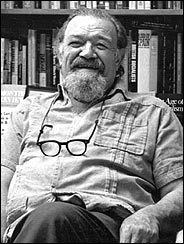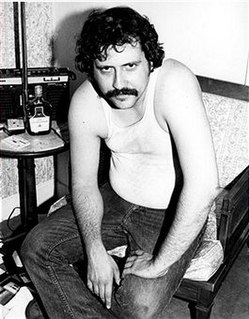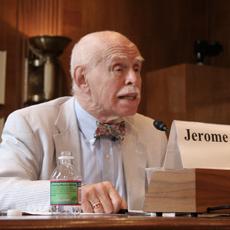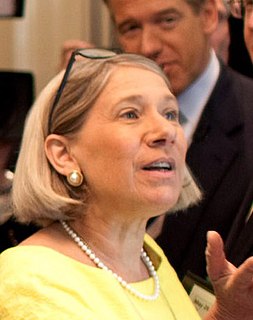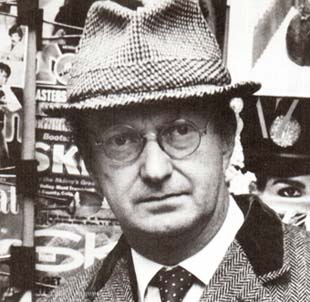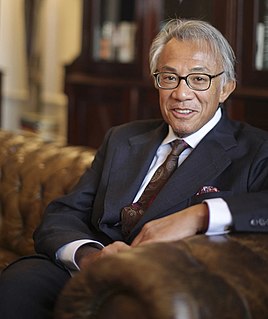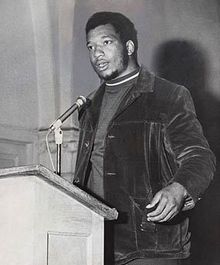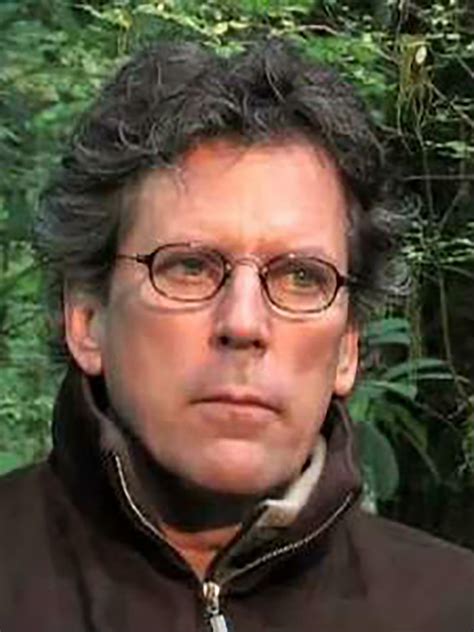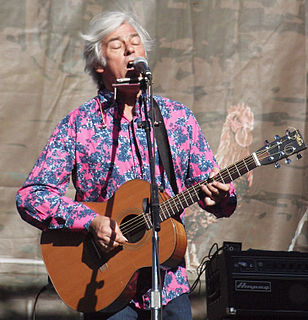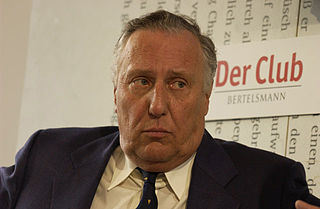Top 136 Mao Quotes & Sayings - Page 2
Explore popular Mao quotes.
Last updated on December 4, 2024.
Yu Na Kim, Mao Asada, Carolina Kostner - all these girls can do triple-triples in their sleep, and they have the skating skills and the spins and the rest of the technical jumps. So I have to have that as well if I want to be able to call myself 'competitive' against them. And when I say 'competitive,' I mean I want to win.
Whatever the price of the Chinese Revolution, it has obviously succeeded not only in producing more efficient and dedicated administration, but also in fostering high morale and community of purpose. The social experiment in China under Chairman Mao's leadership is one of the most important and successful in human history.
Mao said he was prepared to have millions of Chinese people perish in a nuclear war as long as China survived... I'm beginning to find it more and more sick that only humans make it into our calculations... Annihilate life on earth, but save the nation... what's the subject heading? Stupidity or Insanity?
But sea power has never led to despotism. The nations that have enjoyed sea power even for a brief period-Athens, Scandinavia, the Netherlands, England, the United States-are those that have preserved freedom for themselves and have given it to others. Of the despotism to which unrestrained military power leads we have plenty of examples from Alexander to Mao.
Beijing cannot sit by and let her North Korean ally be bombed, nor can it allow U.S. and South Korean forces to defeat the North, bring down the regime, and unite the peninsula, with U.S. and South Korean soldiers sitting on the Yalu, as they did in 1950 before Mao ordered his Chinese army into Korea.
Political prodigies are rare in a nation that grooms top leaders through decades of Communist Party road-testing and pageantry. And because Chairman Mao's cult of personality led the country into extremism, the Party spent the next three decades engineering its politicians to be as indistinguishable as possible.
It could be that all awful dictators are frustrated artists - Mao with his poetry and Mussolini with his monuments. Stalin was once a journalistic hack, and I can personally testify to how frustrated they are. Pol Pot left a very edgy photo collection behind. And Osama seems quite interested in video.
Mao challenged the idea that economic planning would dissolve conflicts of interest among the people. He saw it dialectically - conflicts between intellectuals and manual workers, between the city and the countryside, stratification in the party and society. He said it was necessary to struggle to overcome these differences whether it takes 100 or 500 years.
Chairman Mao creatively applied Marxism-Leninism to every aspect of the Chinese revolution, and he had creative views on philosophy, political science, military science, literature and art, and so on. Unfortunately, in the evening of his life, particularly during the "Cultural Revolution", he made mistakes - and they were not minor ones - which brought many misfortunes upon our Party, our state and our people.
I knew Deng Xiaoping when he came out of prison. He had, after all, been imprisoned for nearly ten years by Mao. I know what China looked like before he took over, and so in my own mind, I don't think of Deng Xiaoping as an oppressor. I think of somebody who, faced with that crisis, made a very painful and decision with which I cannot agree. But I also think of him as a great reformer.
First, there was Confucius. Then, the sayings of Chairman Mao. And now the pithy, ironic, and humorous insights of Ai Weiwei. I thoroughly enjoyed reading this collection, which reflects a well-developed philosophy as well as a keen understanding of the Chinese Communist system. This is China made easy and interesting.
The influence of the Gang of Four should not be underrated, but it should be noted that 97 or 98 per cent of the population hate them intensely for their crimes. This was shown by the mass movement against the Gang of Four which erupted at Tiananmen Square on April 5, 1976, when the Gang were still riding high, Chairman Mao was critically ill and Premier Zhou had passed away.
Marx.... Lenin.... Mao Tse-Tung.... These men were animated by the love of brother and this we must believe though their ends meant the seizure of power, and the building of mighty armies, the compulsion of concentration camps, the forced labor and torture and killing of tens of thousands, even millions.
The third lesson and tip actually comes from two of my favorite political philosophers: Mao Zedong and Mother Teresa — not often coupled with each other, but the two people I turn to most to basically deliver a simple point, which is, you're going to make choices; you're going to challenge; you're going to say, 'Why not?'; you're going to figure out how to do things that have never been done before.
Terrorists are people, too - they are given to error. Naipaul and then DeLillo do a good job in their novels of drawing this out: I'm thinking of DeLillo's contention in 'Mao II' that terrorists have replaced writers as the people who 'alter the inner-life of the culture.' I thought that was marvellous!
Chairman Mao's greatest contribution was that he applied the principles of Marxism-Leninism to the concrete practice of the Chinese revolution, pointing the way to victory. It should be said that before the sixties or the late fifties many of his ideas brought us victories, and the fundamental principles he advanced were quite correct.
In England, we have a curious institution called the Church of England. Its strength has always been in the fact that on any moral or political issue it can produce such a wide divergence of opinion that nobody -- from the Pope to Mao Tse-tung -- can say with any confidence that he is not an Anglican. Its weaknesses are that nobody pays much attention to it and very few people attend its functions.
And who can deny that Stalin and Mao, not to mention Pol Pot and a host of others, all committed atrocities in the name of a Communist ideology that was explicitly atheistic? Who can dispute that they did their bloody deeds by claiming to be establishing a "new man" and a religion-free utopia? These were mass murders performed with atheism as a central part of their ideological inspiration, they were not mass murders done by people who simply happened to be atheist.
Chairman Mao once said that political power comes from the barrel of a gun. He was only partly right: power that comes from the barrel of a gun can be effective only for a short time. In the end, peoples love for truth, justice, freedom, and democracy will triumph. No matter what governments do, the human spirit will always prevail.
Who and of what import were the men whose bones bulk the Great Wall, the thirty million Mao starved, or the thirty million children not yet five who die each year now? Why, they are the insignificant others, of course; living or dead, they are just some of the plentiful others...And you? To what end were we billions of oddballs born?
The Catholic Church spends a lot of time in very poor countries trying to recruit and spread the Gospel. Let me put it that way: The pope is simply saying...? Has he ever said that Mao Tse-tung, that Fidel Castro, that Raul Castro, any other communist is not a Christian? Why Donald Trump? 'Cause Trump wants to build a wall?
As a lifelong student of the world’s wisdom literature, it is my duty to inform students that “ridding the world of evil” is a goal very different from any recommended by Jesus, Buddha, or Muhammad, though not so different from some recommended by the Josephs Stalin and McCarthy and by Mao Tse Tung.
I don't advocate Stalinist monolithic state structures any more than I advocate capitalistic monoliths. Unfortunately, human society tends to the monolithic, whether you go to the left or right, everybody in leathers, or everybody holding Chairman Mao's book, and if everybody goes to one end of the pitch, I always go to the other.
The British left intermittently erupts like a pustule upon the buttock of a rather good country. Seventy years ago it opposed mobilisation against Adolf Hitler and worshipped the other genocide, Josef Stalin. It has marched for Mao, Ho Chi Minh, Khrushchev, Brezhnev and Andropov. It has slobbered over Ceausescu and Mugabe. It has demonstrated against everything and everyone American for a century.
It is amazing how many of the horrors of the 20th century were a result of charismatic quacks misleading millions of people to their own doom. What is even more amazing is that, after a century that saw the likes of Hitler, Lenin and Mao, we still see no need to distrust charisma as a basis for choosing leaders, either in politics or in numerous organizations and movements.

